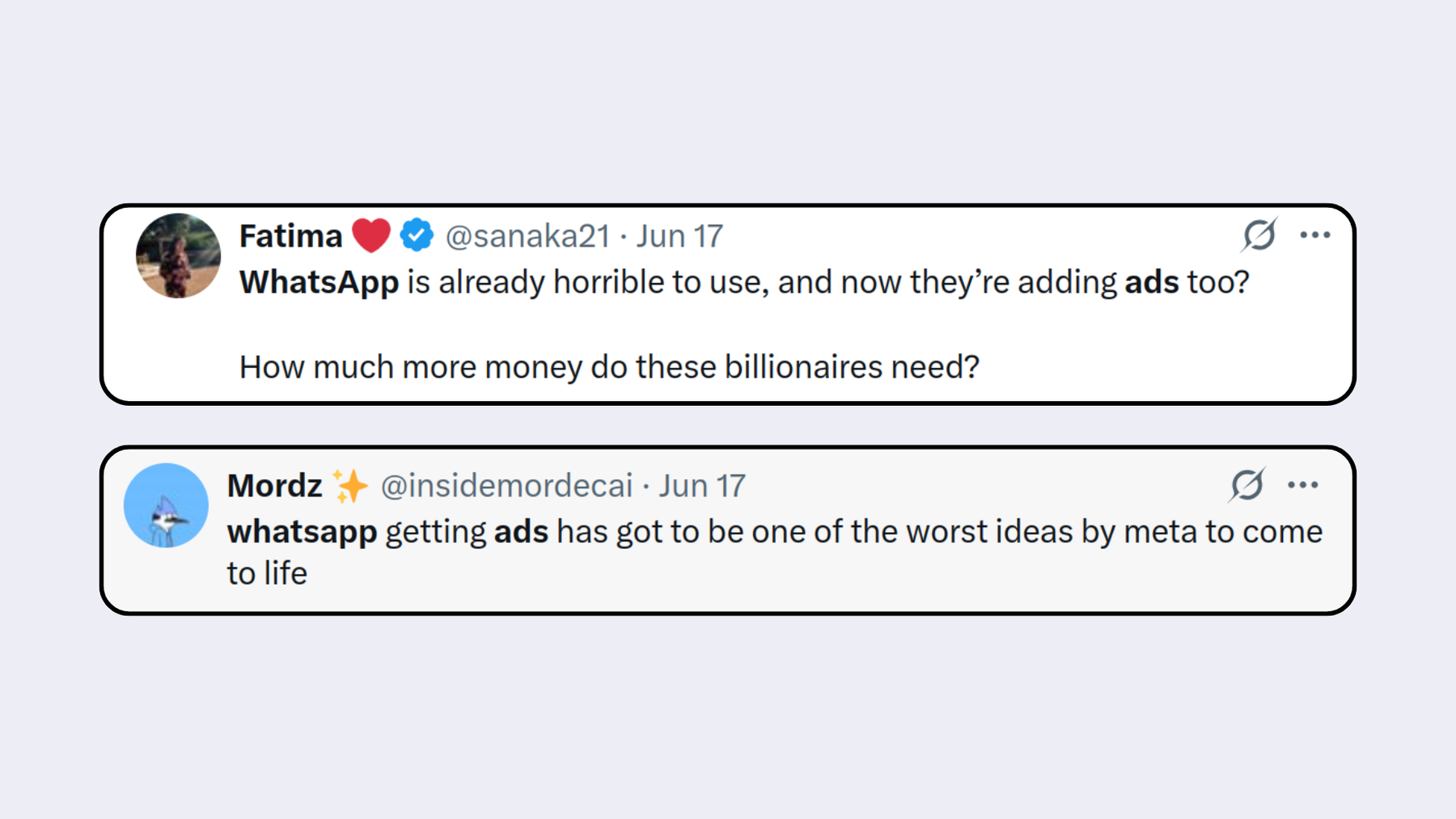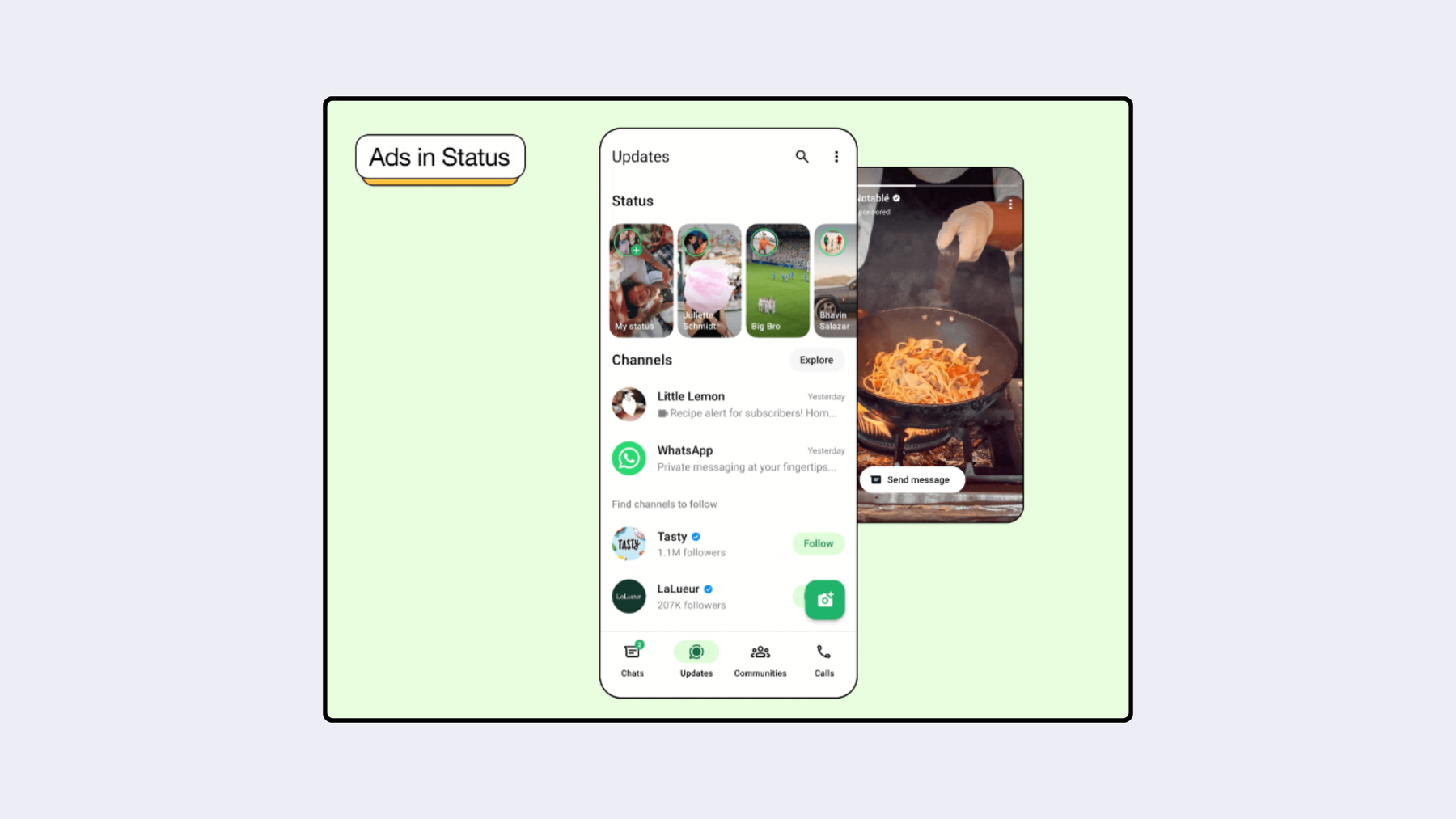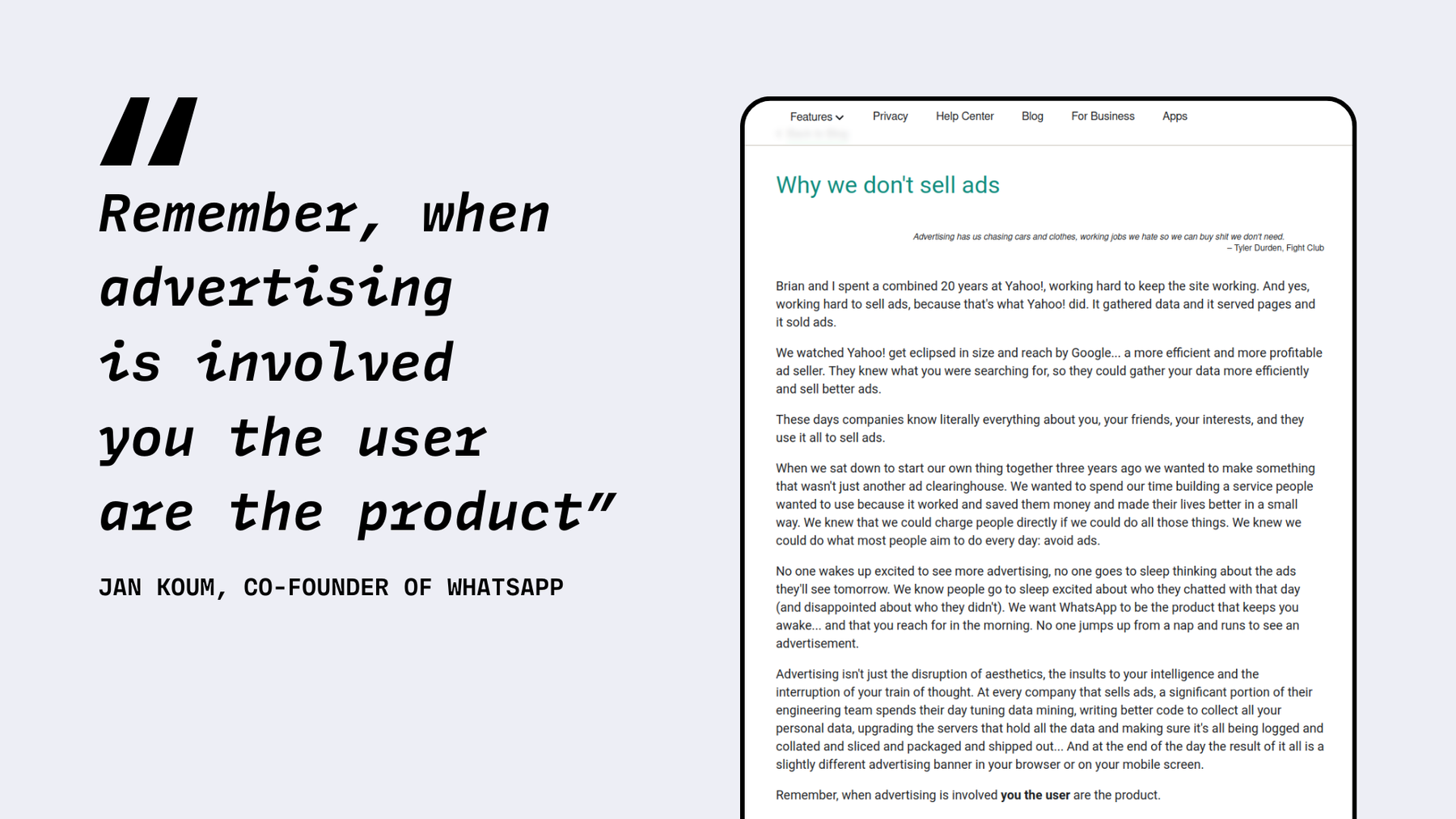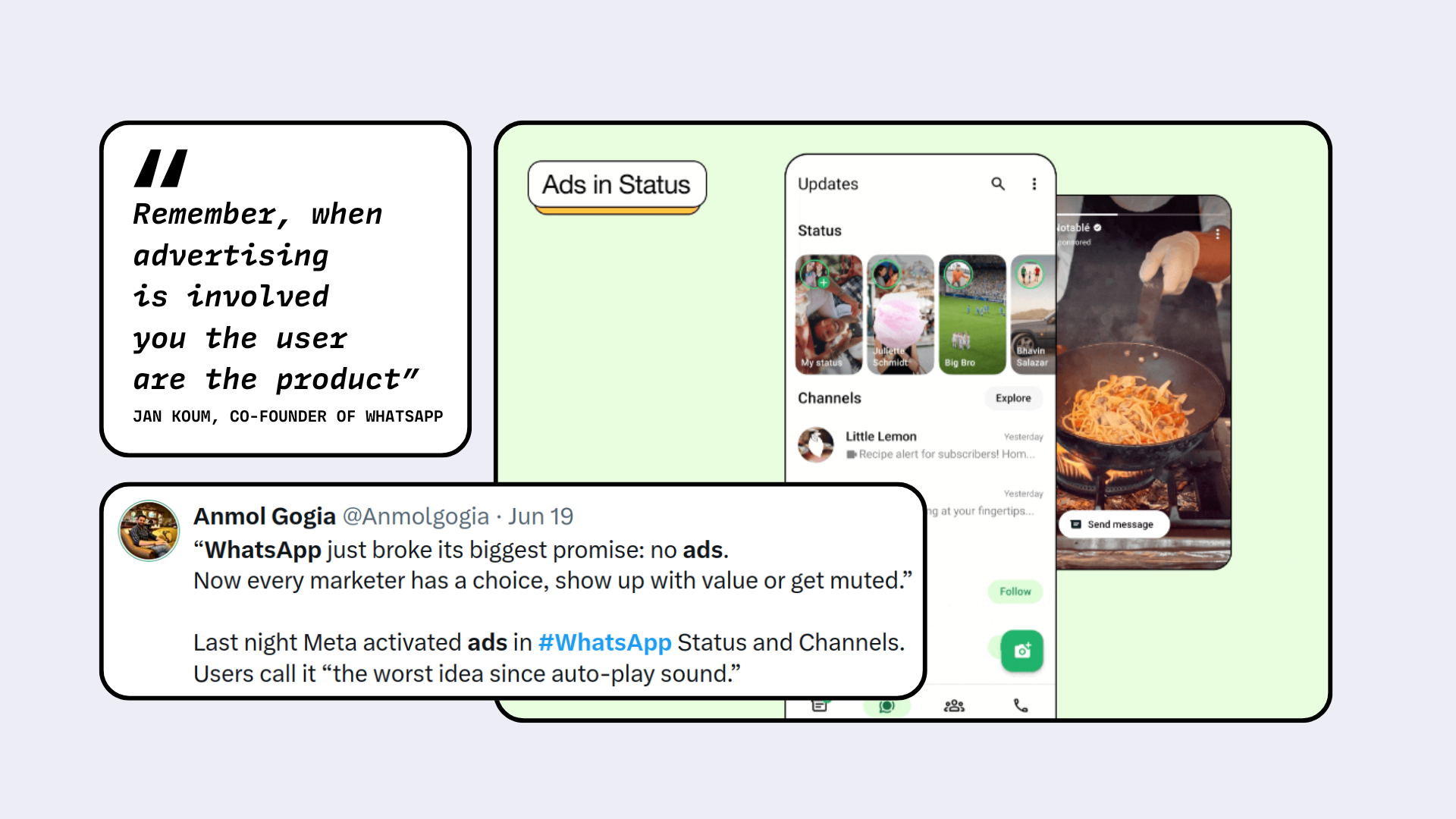How to turn off WhatsApp ads – once and for all.
WhatsApp users say hello to ads - or turn them off with this guide! Meta-owned instant chat app has announced that it will soon start showing ads. But why did WhatsApp break its no-ad promise?
First things first: We’d love to tell you how to turn off ads in WhatsApp – but the new ads “feature” is not optional. If this is the final straw that makes you want to switch to a privacy-focused alternative, it’s perfect timing, and we’re here to help. We’ve put together an ultimate guide to the best WhatsApp alternatives for privacy. Because if you’d like to turn off ads in WhatsApp, you’ll have to quit WhatsApp for good.
Recent WhatsApp changes
Introducing ads in WhatsApp is not the first controversial change of the most popular messenger: Recently, the Silicon Valley tech giant introduced Meta AI in WhatsApp that also can’t be turned off. This update was met with backlash which might make you think, the company would have paused on introducing highly unpopular features and listened to its users. If Meta managers did make decisions based on user interest, they would realize that all people want is a secure, easy-to-use messenger – without the frills of AI and ads. But instead, the tech giant is putting profit above people and has decided to introduce new features in its Updates tab including ads - even though it originally had promised no ads in WhatsApp.


Users on X/Twitter share their concerns over WhatsApp getting ads. Screenshots: X/Twitter.
What do the new features mean for you?
WhatsApp is the instant messenger of choice for 1.5 billion people globally who use the tool for its primary service – messaging. But with the recent introductions of AI and now ads, the WhatsApp Messenger is sadly starting to feel like another one of Meta’s social platforms flooded with unwanted ads and driven to make profit.
The new ads which can be found in the Updates tab of the chat app mean that you will start seeing ads in both the status and channel sections, you will also be targeted with promoted channels, and you’ll be able to subscribe to channels for a monthly fee.
And this is despite the fact that no one on the internet likes ads. In fact, the more ads you see online, the more it feels like the ad-based business model should be dying already. We at Tuta call for a ban on targeted ads – and we are not the only ones.
While in some services, you can block ads, for instance, if you use Gmail in a browser, but you can’t block ads in WhatsApp.
In WhatsApp’s announcement of the new ads feature, it said that the targeted ads and channel-ads you see will be based on information like your city, country, language, the channels you follow, and your interactions with the ads – but not on the content of your chats which will remain end-to-end encrypted.
For users who have linked their WhatsApp to Instagram or Facebook, the ads they see will be even more personalized.
While the ads will not appear directly in your chats, they will be in the updates tab and within your instant messaging app.


With the new features coming to the Updates tab of WhatsApp, there will now be ads displayed in the status section. Screenshots: WhatsApp blog.
Now, you may be thinking this doesn’t affect you and your messaging experience if you don’t check this tab but that’s far from the truth – having ads within an app whether you see them, click on them or don’t, does affect your privacy.
As the co-founder of WhatsApp, Jan Koum wrote in a WhatsApp blog post back in 2012, “Remember, when advertising is involved you the user are the product.”


In 2012 co-founder of WhatsApp, Jan Koum shared an article explaining why WhatsApp didn’t sell ads. He even warned, “Remember, when advertising is involved you the user are the product”. Screenshots: WhatsApp Blog.
Profit over people and privacy
WhatsApp’s founders Jan Koum and Brian Acton had a strong vision for an add-free and secure instant messenger when they launched WhatsApp, in fact they even said they would never place advertisements in it. Then Facebook (now Meta) bought the platform and in 2016 it announced that it was changing its paid subscription structure to be completely free. With this change, it reiterated that it would continue to offer instant messaging without “third-party ads and spam”.
So what made Meta retract on this firm decision to not have third-party ads in WhatsApp? Profit.
Meta who is a prime example of the ad-based business model made a whopping $160 billion in ad revenue in 2024 from Facebook and Instagram, and now it will make even more by serving ads in your WhatsApp.
And while Meta tries to mask these new features as private by saying things like “we’ve built these features in the most private way possible” and “Ads built with privacy in mind” this most likely is pushed by Meta’s marketing team which can be called privacy washing.
The future of WhatsApp
WhatsApp used to be a great tool – a simple chat messenger for connecting people, individuals, in groups, or even via channels. But the more WhatsApp matures, the more Meta wants to monetize it. And this latest move to introduce ads puts the nail in the coffin for many people.
By now, WhatsApp feels far from a private messenger and more like another one of Meta’s profit-driven platforms. Even if messages and calls are end-to-end encrypted and message data is not used for ad purposes, the mere existence of ads makes WhatsApp less attractive.
While WhatsApp is still the most used instant messenger, this can change. With the direction it appears to be going in, it’s likely that more people will choose to quit the app. And this will not be the first time, back in 2021 when WhatsApp changed its privacy policy, many users decided to switch to Signal.
As an end-to-end encrypted email and calendar provider that’s open source and ad free, we at Tuta Mail encourage you to take back your privacy and opt for more secure and private communication solutions, because you deserve real privacy and data protection.
A better web is possible and the services are there, now it’s up to you to take back your data and stop Big Tech from abusing it!


